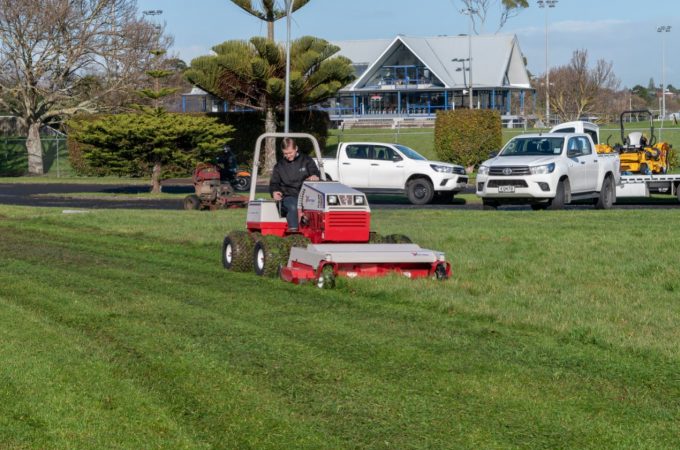
Photo: Commercial Outdoor Machinery
Filing outside for a quick lunch is no longer the status quo because schools have caught on to the effectiveness of outdoor learning. Every space on campus is a potential learning space, and there are infinite ways to make use of a well-maintained lawn or sports field in an education setting.
The knock-on effect is that maintaining grassy green space has become a full-time gig for schools, particularly in multi-use areas where sports, playtime, and outdoor lessons are in near-constant rotation.
Do different spaces require different maintenance?
We spoke to a couple of industry experts who specialise in grassy maintenance equipment for schools to find out more.
Ken Johnston, the general manager at Commercial Outdoor Machinery, advised us the goal would be to “use the one tractor for everything”. He said that “mowing, edges, trimming hedges, blowing leaves, shifting mulch, moving rubbish bins, towing trailers, brooming the path, aeravating the field, turf renovation like reseeding” can all be handled by a specialist tractor and any additional components can be hired.
He informed us that there have been technological advancements that schools can benefit from too. “Especially around health and safety, which is critical in today’s environment where if an operator hurts themselves, management can be held liable.”
Read our new Term 4 issue online today!
Mean Green Mowers’ Bruce Scott specialises in large, electric machines for lawn maintenance. “Commercial electric mowing is a reality,” he explained.
“All school mowing can be done electrically” and, he argues, “there is really no excuse not to, particularly for schools whose children are demanding action on climate change”. For those who may not be familiar with electric mowers, Mr Scott said it was important for people to realise they “are not toys, but fully commercial machines that inevitably save money in the long run”.
Key considerations for mowing your green space: specialists sound-off
It’s a no-brainer for Mr Johnston: he told us schools should “get a comfortable mower that becomes the caretaker’s best friend. He can use it to shift rubbish bins, and do the full works, so it becomes much more than ‘just a mower’.”
He also suggested schools think about how they can transform their green spaces into usable learning areas: “I have seen a school that was so wet they couldn’t use the field for six months of the year because it was so waterlogged! They made the right investment, and this year was the first year they could play home rugby games in a winter!”
“If you have hard fields, you undoubtedly get more kids getting injured. If you lift your foot 30cm up off the ground, stomp it back on the floor, and feel a shock wave come almost up to your knee – that is how the kids feel every time they run on an over–compacted field. Running a tractor with specialist attachments over the ground to lift the soil level will fix this. So, safety is one benefit but there’s also better grass growth, etc.”
Mr Scott strongly believes the environment must be a significant factor for schools investing in green space maintenance. He told us: “Children are marching the streets demanding action on climate change, so compare the leasing costs of an electric machine with your spend on petrol/diesel and maintenance of conventional mowers.”
Mr Scott explained: “A lithium-ion battery in a 74–inch machine offers eight hours of continuous mowing. For example, it could mow larger fields, like the eight-hectare stretch of lawn at Christchurch Boys High, in around five hours. Auckland Grammar could be mowed in three hours. It’s a simple calculation really: compare all the diesel and maintenance required for a tractor mower with the minimal costs of running an electric machine. Then, add all the other benefits like low noise and zero emissions. However, probably most significant are the health benefits to both operators and the school community.
“One large diesel machine is equivalent to around 10 cars per year in terms of carbon emissions, so leadership is required from principals and boards to specify the electric mowing of school grounds.”
Educators and politicians are trying to address the current teaching shortage through different policy settings.…
Melanie Webber was the president of the secondary school union PPTA Te Wehengarua from 2021…
Wait times for paediatric care is having an impact on young people’s education and the…
Home of the brave, land of the free… except when it comes to books for…
Could a gender achievement gap in maths be due to confidence? Sarah Buckley from the…
The much-delayed English draft curriculum is now out for consultation, generating discussion from teachers.
This website uses cookies.